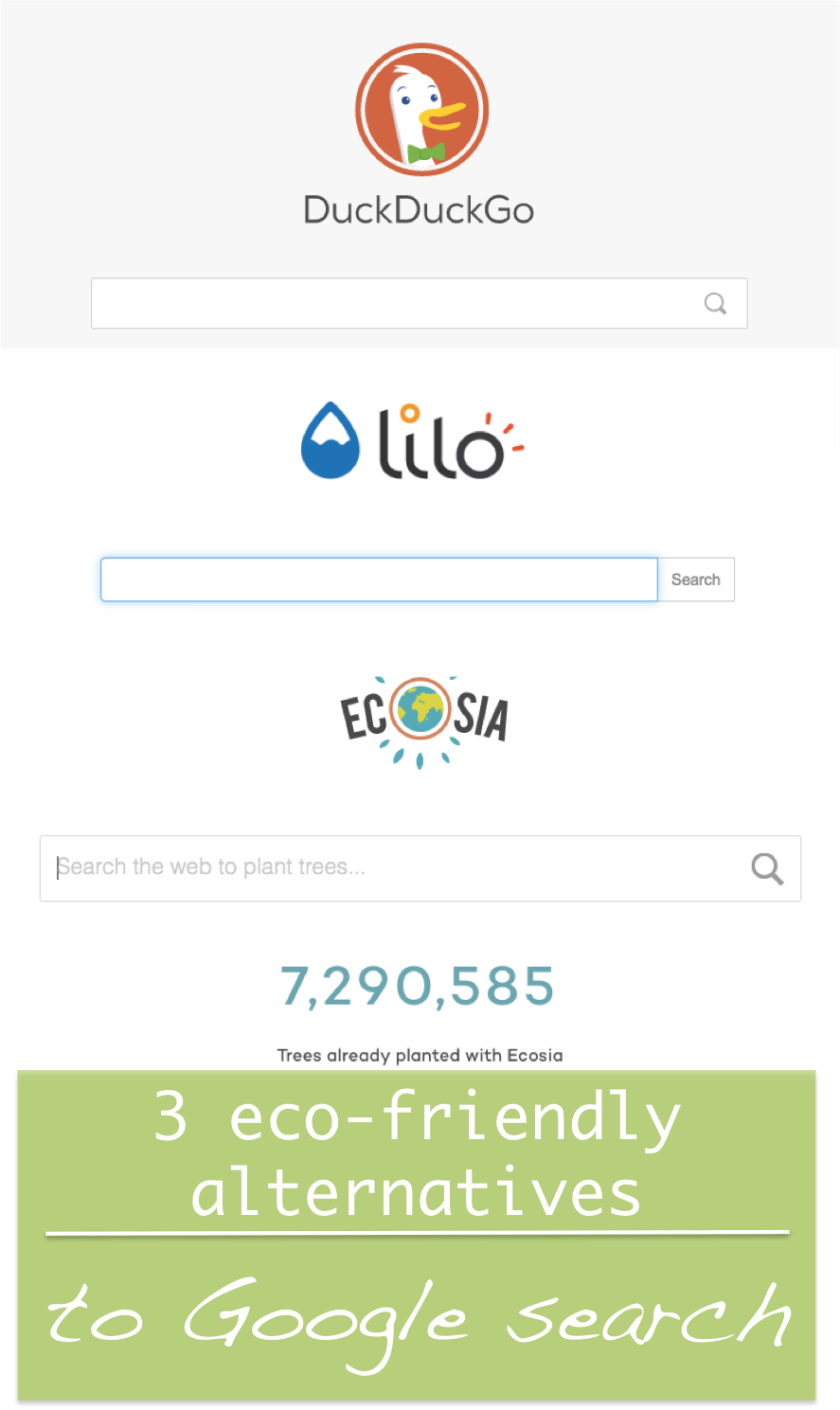We all use search engines every day, without really thinking about it. Most of us would use google because they keep implementing convenient functionalities, but behind the scenes they are selling our data to advertisers that are trying to sell us things we don’t need.
What if there was a way to make internet searches while protecting our privacy and making a positive contribution for the planet ? I have tested three alternatives to google search that aim at protecting the user’s privacy and contribute to something bigger.

DuckDuckGo: it’s all about privacy

When I started worrying about my privacy on the internet, I first came across DuckDuckGo. This search engine is not eco-friendly per se, but it has a very high commitment on its users’ privacy: from not tracking users’ data to showing the same content to every user for the same search. For that purpose, it has developed its own search algorithm. It used not to have sponsored content, but added some to keep the project alive. However it is possible to opt out in the settings. If you use Safari or Firefox to surf the web, you can choose it as your default search engine.
I tried DuckDuckGo in its early days but came back to google pretty fast as I was not very satisfied by the search results. I tried it again last year and it has improved a lot, but it would still fall short when I would look for a combination of more than two ideas. I was finishing writing my thesis at the time and ended up having to use google for at least one third of my searches, which was not very convenient.
Lilo: support community projects

I still had in mind that I wanted to find an alternative to google search, so when one of my friends shared a post about Lilo on Facebook, I did a bit of research and set up to try it. The concept behind this search engine is to divert the ad revenue generated by our internet searches to finance positive changes. Lilo redistributes 50% of their revenue to support environmental and social projects. For each search you make, you earn a drop of water. You can then choose to support the projects you like in a list of partner projects.
It works with the google search algorithm while protecting its users’ privacy (it doesn’t save personal data and protects you from web and advertisement tracking, but some basic info have to be passed on to google) so you don’t have to compromise on the search result quality.
Then there is the problem of the energy search engines consume. The internet gives this sense that things are dematerialised and it is easy to forget that behind each search there is an impact on the real word. Lilo offsets the carbon emission of its searches. This is also true for google, which uses 56% renewable energy and finance carbon reduction projects to offset the rest (see this Greenpeace report to know more about the green efforts of the giants of the internet).
I have been using Lilo since the beginning of the year and I am very happy with it. I only switched back to google for a couple of tricky IT questions that were hyper specific. To use it by default, you have to install a plugin on your browser. If you don’t like plugins, you can bookmark search.lilo.org. I like to see the drops accumulate through the month (I try to give my drops at the end of each month). It helps me realise how many searches I make and it is super nice to choose a project and give the drops away.
Ecosia: let’s plant trees

Ecosia works in a similar way as Lilo, using Yahoo and Bing’s algorithm and giving away 80% of its ad revenue to a reforestation plan. You also need to install a plugin to use it. It is not completely clear to me where Ecosia stand in terms of the energy. I read here (have a look at the article if you want a more detailed comparison of Ecosia and Google search) that Bing and Yahoo are carbon neutral although Greenpeace ranks them lower than Google on green internet leadership. I didn’t find out if Ecosia does anything specific about their own energy use, but I guess since they contribute to planting so many trees they must offset the extra energy anyway.
As for privacy, Ecosia don’t store permanently any personal data, but need to send some of them to Bing. Having read privacy policy of both Lilo and Ecosia, I would say Lilo is slightly better on that front, but if privacy is your main concern nothing beats DuckDuckGo.
I tried it for a few weeks and didn’t find a significant difference with Lilo in terms of the quality of the search results. As with Lilo, you can keep track of how many searches you make in the form of a counter telling you the number of trees you helped plant. Since you don’t have to choose which project to support, it doesn’t require any extra work to contribute to planting trees once you have started to use it. Although I like the idea that I can choose what kind of project I support.
***
In conclusion, my current favourite search engine is Lilo, but that might just be a bit of chauvinism as the founders of the project are French 🙂 What about you ? Are you ready to try something different for your internet searches ?


